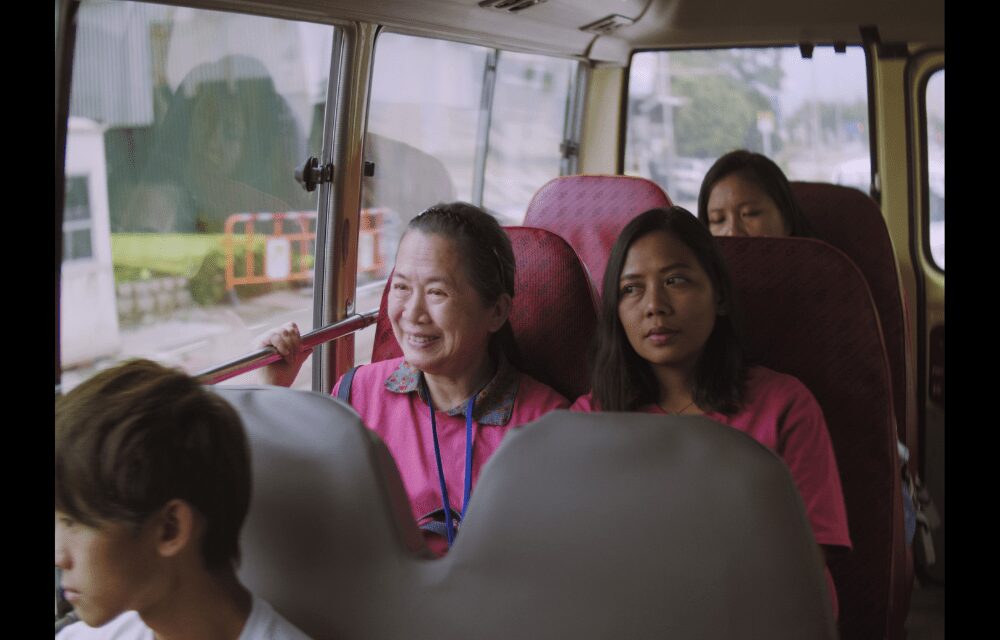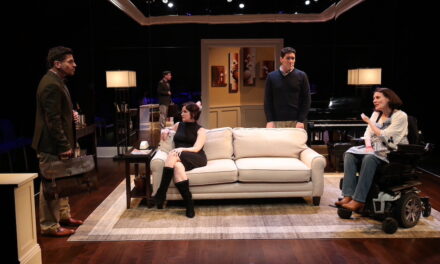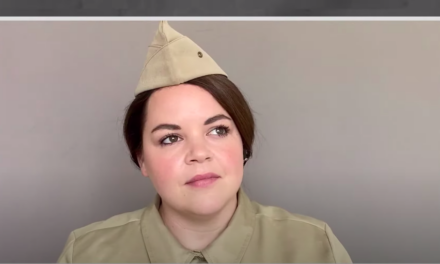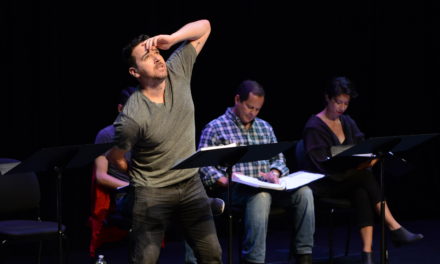Sitting in a decidedly Hong Kong-flavoured café in Prince Edward, Leung Ming-kai and Kate Reilly present as an old married couple, even if they’ve only been bound in matrimony for seven years. They talk over each other, fill in blanks, and speak in a shorthand unique to them – so you can see how they might function as a directing unit. Of course, Leung’s tolerance of Reilly’s crush on another man helps.
“You were also thinking about the hottest guy in the industry,” says Leung with a wry grin, when asked what brought the pair to Hong Kong.
“Sammo Hung?” Reilly replies with a nod. “I do, I think he’s kinda hot!”
The exchange demonstrates the easy back-and-forth of long-term partners – professional and personal. Leung is dry and understated. Reilly is animated and verbose. The rapport likely brought balance to the shooting locations in their first feature as directing partners, Memories to Choke On, Drinks to Wash Them Down.
The two connected “a million years ago” when Hong Kong-born Leung was studying filmmaking at Columbia University, in New York, and Minnesota native Reilly was a budding actor, working with the Polybe + Seats and the Peoples Improv theatres. The notoriously cranky Village Voice called her “a pleasure to watch.” Leung shot a film for a classmate that Reilly starred in and the rest, as they say, is history. She was essentially commuting to Hong Kong when Leung returned after grad school in 2008 to kick off a career as a cinematographer (Ray Yeung’s Suk Suk, Sylvia Chang’s Murmur of the Hearts) until they got married in 2013 and made the move back to Hong Kong permanent five years ago. To which many would ask: Why?

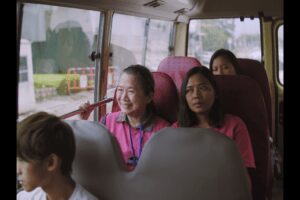


Leong Cheok-mei and Mia Mungil in Forbidden City.
Making a film in the United States, where they could both work, is a matter of either too many artists jockeying for the same Hollywood resources or navigating a sprawling, disconnected indie scene.
“Even in independent film the scale is twice of a first feature here,” explains Leung of the decision to remain in admittedly challenged, but action-based Hong Kong. In Leung’s experience, indie Hong Kong directors have more creative control and are less likely to succumb to what he calls “the mercy of actors.” Decisions take a lot longer to happen, he adds. “I think the stories we come up with are more connected to Hong Kong, too.”
Neither is convinced that Hong Kong filmmaking is on the verge of collapsing due to the need for distribution in mainland China, or being constricted by the National Security Law, in part thanks to a re-energized independent sector that has been buoyed by the success of films produced under CreateHK’s First Feature Film Initiative (starting with Wong Chun’s Mad World in 2016). Reilly sees the challenges as a force that has galvanized and unified artists.
“It’s important for me to be part of an intimate community,” she says. “We all support each other—in my experience—and it’s nice that so many filmmakers with very different aesthetics and goals still pitch in, because we need each other. And I find it exciting to be part of a new nascent community.”


 Zeno Koo and Lam Yiu-sing in Toy Stories.
Zeno Koo and Lam Yiu-sing in Toy Stories.
Memories is the kind of scrappy, all-hands-on-deck indie pioneered by maverick American filmmaker John Cassavetes in the 1960s, so Leung and Reilly could be setting up shop as the Cassavetes and Gena Rowlands (his wife) of Hong Kong – if Rowlands had ever co-directed with Cassavetes. Both are steeped in the cinema they discovered as teenagers, and those influences can be seen in Memories. Reilly cites Ann Hui’s Ordinary Heroes and Mabel Cheung’s An Autumn’s Tale as early eye-openers for her, as examples of women making films in the 1980s – and long before she met Leung.
“These two women from Hong Kong were the reasons I started thinking about making films,” she recalls. “They made me think there was a place for me in filmmaking.”
In Leung’s case, the humanity of director Krzysztof Kieślowski’s films, including the Three Colours trilogy, made a lasting impression.
“He’s got great technical skill,” he says. “He can be realistic, he can be stylized, but he’s always about the human aspect.” But there are more prosaic influences as well. Reilly admits to Eddie Murphy’s reversal of fortune comedies like Trading Places as a major factor in her work for their pithy jabs at society. “If I have something heavy to say I want to make it as light as possible. I think that’s how you reach people.”
Leung agrees, pointing out Hong Kong comedies of the era also had satire and social observation in them, like Tsui Hark’s Working Class and Clifton Ko’s Chicken and Duck Talk.
“I think indie cinema, because its survival relies on a local audience, takes a more serious path,” he says. “We know things can be hard. We knew the stories had the potential to be serious, but we thought, ‘Let’s make it humorous. Let’s make it light.’”
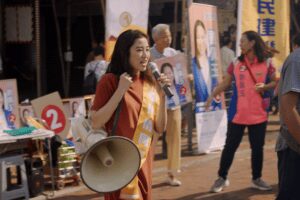
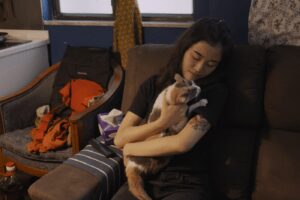

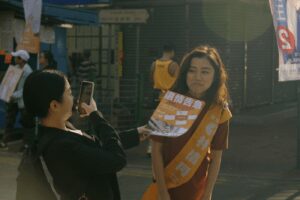
Jessica Lam Sin-tung in It’s Not Gonna be Funny.
Starting with a modest seed grant of HK$280,000 from the Arts Development Council, Leung and Reilly tapped every favor they could, from every friend in the industry they had, and scraped together a working budget. “We had Visa, MasterCard, all the cards,” jokes Leung. They also had a skeleton crew (“More like ashes,” he says) and a solid cast. The quick production schedules helped them gain access to actors they may not have been able to secure for a larger feature. Some of the independent scene’s brightest lights, Gregory Wong (29+1), Zeno Koo (i’m livin’ it) and Lam Yiu-sing (Suk Suk), turn in resonant performances, with Wong improvising some of his segment’s pithiest lines.
Memories was born in the wake of the 2014 Umbrella Movement, which inspired Leung and Reilly to capture the volatile, trepidatious mood of the city in some way. Written over a Christmas break in Minnesota, the film began life as a more traditional narrative but morphed into something else time and time again, until the idea of four short films blossomed. Leung and Reilly shot between February and November last year.
Cassavetes’ legacy may be his respect for stories about “normal” people, adding credence to parallel to Leung and Reilly. Memories’ snapshots capture the omnipresent but under-interrogated elements in everyday Hong Kong life. It’s about “struggling on things that are painful, that you can’t dislodge” and then washing them away with a hydrating or stimulating salve says Reilly, referring to the title. The Cantonese version refers to the universal concept of enduring something unpleasant: je6 hoeng1 (夜香), literally “night fragrance,” otherwise known as poop.
They’re also a combination of personal reflection and observation. Leung and Reilly agree there’s a little bit of her relationship with her brother in one piece, and Leung’s childhood stomping grounds in diverse, working-class Sham Shui Po figure prominently. The four shorts trade in the familiar but manage to amplify the nuances that make the subjects unique to the SAR. For Reilly, the relationship between domestic workers and the elderly residents often in their care is far more intimate than people give it credit for. In one short, “Forbidden City,” Leong Cheok-mei and Mia Mungil play refugees—one political, one economic—with a deeper connection than anyone realizes.
Leung wanted to make sure the people he credits as being the backbone of Hong Kong had a spotlight in the film, too.
“Young Hong Kong women run the city,” he says. “They have strong characters, so if the movie didn’t have a representation of Hong Kong women that would just be very sad.”
To that end, “It’s Not Gonna be Fun” follows bracingly pragmatic Sham Shui Po barista Jessica Lam Sin-tung as she attempts to pull off an AOC (New York bartender-turned-US congresswoman Alexandria Ocasio-Cortez) kind of transformation in running for District Council in the film’s sole documentary segment.
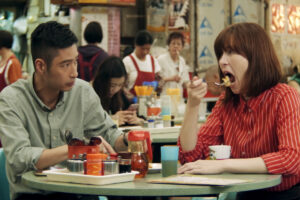
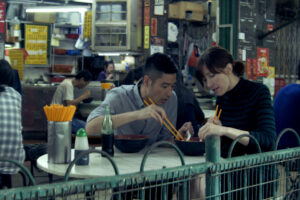
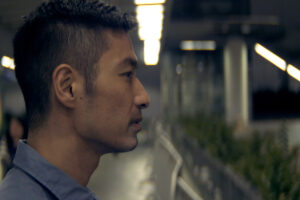
Gregory Wong in Yuen Yeung.
In between, “Toy Stories” and “Yuen Yeung” explore conflicting emotions set against some of the city’s most singular landscapes. The former spends an evening with two brothers (Koo and Lam) in an arcade toy shop, those crowded emporiums all Hong Kong people will recognize. The latter is a rambling quasi-romance between a local teacher (Wong) and an imported English teacher as it emerges on a tour of iconic Hong Kong food creations. Reilly co-stars, and is fully aware of the optics – the awkward perception of an under-qualified interloper in the midst.
“I was very nervous about that one,” she says, still sounding nervous the two-hander format won’t land with viewers. “’Yuen Yeung’ has been a favourite on the festival circuit so far, but if it failed I would be this white woman who came here and put herself in a movie! What a disaster!”
Memories is more bittersweet than guffaw-inducing, but it does have a welcome light touch.
“People need a laugh, and that’s even more true now,” says Reilly. “I’m glad we made it, not realizing how many people needed it.”
After making the rounds at a handful of key festivals this year, including the International Film Festival Rotterdam and the New York Asian Film Festival, local audiences will get a chance to see Memories when it opens on November 19, another indie able to take advantage of screens normally crammed with prestige dramas during so-called awards season. In the meantime, Leung and Reilly are working on two follow-up films, one a musical comedy pitched at Hong Kong-Asia Film Financing Forum in 2018 they weren’t ready to tackle at the time, the other an intimate drama Reilly doesn’t want to reveal too much about just yet. But for the immediate future, both are hoping Memories connects with its home audience.
“We were in Rotterdam for Chinese New Year and the famil[ies] here—old people, young kids—[were] watching a movie [together], and that’s what we want,” finishes Leung. “People go to movies on dates. We want them too. We want them all.”
Memories to Choke On, Drinks to Wash Them Down opens November 19.
This article was originally posted to zolimacitymag.com on November 19, 2020, and has been reposted with permission. For the original article, click here.
This post was written by the author in their personal capacity.The opinions expressed in this article are the author’s own and do not reflect the view of The Theatre Times, their staff or collaborators.
This post was written by Elizabeth Kerr.
The views expressed here belong to the author and do not necessarily reflect our views and opinions.

